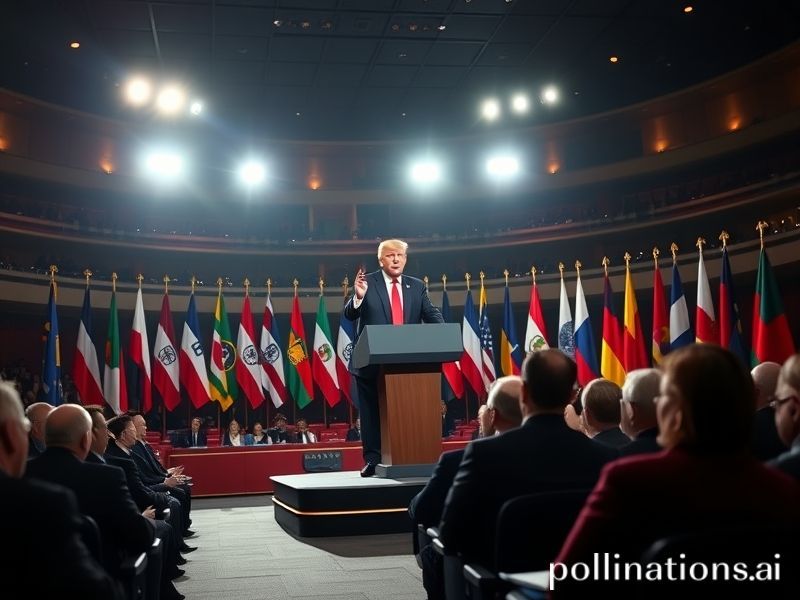Trump vs NATO: How One Divorce Threatens World Peace and Your Weekend Plans
NATO’s Existential Midlife Crisis, Starring Donald Trump and Your Peace of Mind
By Dave’s Locker International Desk
PARIS—If NATO were a person, it would be that fifty-something divorcee who just woke up to find half the household budget missing and an ex texting “I never loved you anyway.” The ex, in this case, is Donald J. Trump, and the household budget is the collective defense spending of 31 democracies. Since 2016, Trump has treated the Atlantic Alliance the way a bored teenager treats a gym membership: signed up for the photo, rarely shows, and loudly questions why he’s paying for other people’s showers.
Europeans, bless their subsidized hearts, spent four years clenching espresso cups while Trump mused aloud whether Article 5—the “an attack on one is an attack on all” bit—was more of a suggestion than a blood oath. At the 2018 Brussels summit he reportedly threatened to “do his own thing” if allies didn’t cough up 2 % of GDP faster than a TikTok trend. Diplomats translated that as “America might ghost you,” a prospect about as comforting as a “check engine” light on a transatlantic flight.
Cue the global implications. Japan, watching from the Pacific cheap seats, quietly accelerated its own re-militarization plan. If the American bouncer walks off shift, Tokyo figures it’d better bulk up before Beijing starts offering “protection.” South Korea, meanwhile, ordered another round of THAAD batteries like nervous bar snacks. Down in Canberra, officials rehearsed the polite fiction that AUKUS is about submarines, not the possibility that Washington could simply lose interest one Tuesday afternoon.
The real panic, however, unfolded inside Europe’s chancelleries. German defense planners—historically as fond of military spending as a vegan is of bratwurst—suddenly discovered a €100 billion “special fund” down the back of the Bundestag sofa. France, never shy about strategic narcissism, floated the idea of “European sovereignty,” which roughly translates to: “We’d like an army that doesn’t need a permission slip in English.” Poland, blessed with geography that makes it the doormat between empires, welcomed U.S. troops like overenthusiastic Airbnb hosts: “Please, park your tanks anywhere.”
Trump’s NATO critique is, of course, equal parts grift and grievance. Behind the transactional bluster lies a genuine American frustration: the U.S. subsidizes European welfare states so thoroughly that Luxembourg has more tanks per square kilometer than potholes, yet still lectures Washington on carbon emissions. Still, threatening to quit the alliance because Belgium bought too many solar panels is like torching your marriage over the thermostat setting—dramatic, permanent, and deeply stupid.
The irony is that Trump’s bullying worked, sort of. By 2023, European defense spending crept past the 2 % line like a guilty husband tiptoeing home at 3 a.m. NATO’s coffers are fuller, but the trust deficit is Grand Canyon-sized. Allies now hedge as enthusiastically as a forex trader on election night: Germany signs port deals in India, France courts Gulf monarchs, and even Canada—Canada!—talks about “Indo-Pacific strategies” as though Ottawa might soon station Mounties in the South China Sea.
What comes next depends on whether Trump returns for a 2025 encore. A second act could see the alliance reduced to a Netflix subscription everyone forgot to cancel: technically active, rarely used, and quietly draining the credit card. European officials already game-plan a “coalition of the willing” without Washington—code for “we’ll fight Russia until the Americans sober up.” Meanwhile, Putin, ever the opportunist, watches the drama like a poker player who just realized the rest of the table is arguing about the blinds.
At its core, the Trump-NATO saga is a cautionary tale about alliances in the age of narcissistic populism. Treaties used to be carved in marble; now they’re written in disappearing ink on whichever leader’s ego needs a fresh coat. The world has learned that American protection is contingent on the electoral mood of Pennsylvania suburbs—a geopolitical reality as stable as cryptocurrency and twice as volatile.
In the end, the joke may be on all of us. NATO was designed to keep the Americans in, the Russians out, and the Germans down. Trump merely added a fourth clause: the Europeans confused. Should the alliance survive its midlife crisis, historians will note it was less a triumph of strategy than a cosmic accident—proof that even a narcissist can occasionally blunder into useful policy. Until then, keep your fallout shelter stocked and your irony detector fully charged. The adults, it seems, have left the war room.







